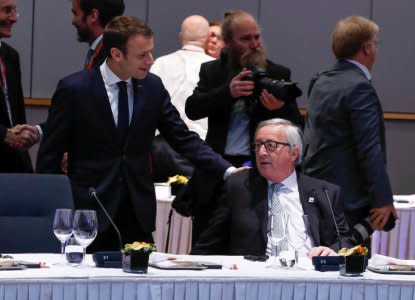EU leaders resist push for elected Commission chief

Thomson Reuters
BRUSSELS (Reuters) - Leaders of the European Union's member states agreed on Friday to resist a push to have the EU chief executive determined by voting in elections to the European Parliament and aim to keep their collective control over the post.
An EU official, briefing reporters during a Brussels summit of the 27 leaders - excluding Britain - said there had been "full agreement" that the successor to European Commission President Jean-Claude Juncker would not automatically be the nominee of the party that gets most votes, as EU lawmakers have demanded.
Some governments have spoken in favor in recent weeks of following the parliament's call. But these are in a small minority in the European Council, diplomats said on Friday.
Known from the German as the Spitzenkandidat, or lead candidate, system, it was introduced, against leaders' wishes, for Juncker's appointment in 2014.
But the consensus, the official said, was that leaders would retain their autonomous right to nominate the Commission head, taking into consideration the election result, as they are obliged to do by treaty.
Parliament has passed a resolution that it will withhold its required confirmation from any Commission president who is not a Spitzenkandidat for a party -- though that decision will be one for the next legislature elected in EU-wide voting in May 2019.
Juncker himself has thrown the Commission's weight behind the Spitzenkandidat idea, whose supporters describe it as an enhancement of EU democracy. But he also cautions that there should be no "automaticity" in choosing his successor, who will need majority support in both the European Council of leaders and Parliament.
If Parliament rejects the Council's nominee to run the Commission, there would be political deadlock until some compromise could be found.
POWER PUSH
While Parliament is pushing for more power in Brussels as a way of improving the EU's image as a democratic project, many national leaders insist that they are more representative of people's wishes than a legislature for which less than half of the electorate bothered to vote.
Many are also concerned that limiting the choice of the influential head of the Commission to those free to campaign for the EU election restricts their ability to nominate, for example, serving heads of government to the post.
Juncker will step down in November next year. The Council should nominate his successor after the May 2019 elections in time for the new Commission president to name a line-up of commissioners to be confirmed by Parliament.
At Friday's summit, leaders voiced agreement with Parliament's proposals for reducing its size and reallocating some seats after Britain leaves the Union in March 2019. A formal decision will be taken on that by June.
They also confirmed that a proposal, backed by French President Emmanuel Macron, to allocate some British seats to new, pan-European constituencies would not be considered for next year but should be studied for the 2024 elections. Many states are skeptical of the notion of "translational lists".
Macron's proposal to launch "citizens' consultations" on the future of the EU ahead of the 2019 election was accepted by leaders meeting for informal talks on Friday, the EU official said. A French official said the president would launch that project on April 17.
Leaders rejected a suggestion by Juncker that his role and that of the summit chair, currently former Polish premier Donald Tusk, be merged.
There was also no support for Juncker's idea to downsize the Commission, as all 27 members want their own commissioner.
"The ideas presented by Juncker of merging the top jobs, cutting down the Commission are dead. The funeral was at the summit today and it was a silent one," one EU diplomat present said, noting not a single EU leader spoke in favor of the proposals.
(Reporting by Alastair Macdonald; editing by John Stonestreet)
See Also:

 Yahoo News
Yahoo News 
